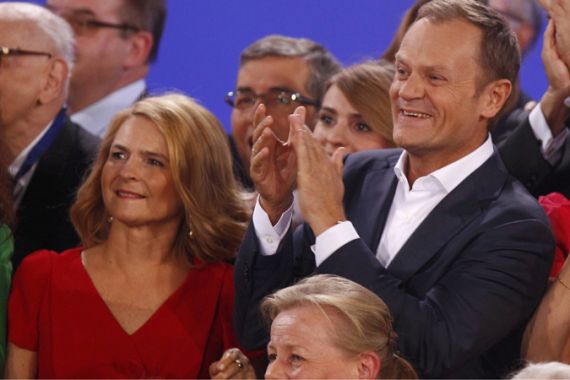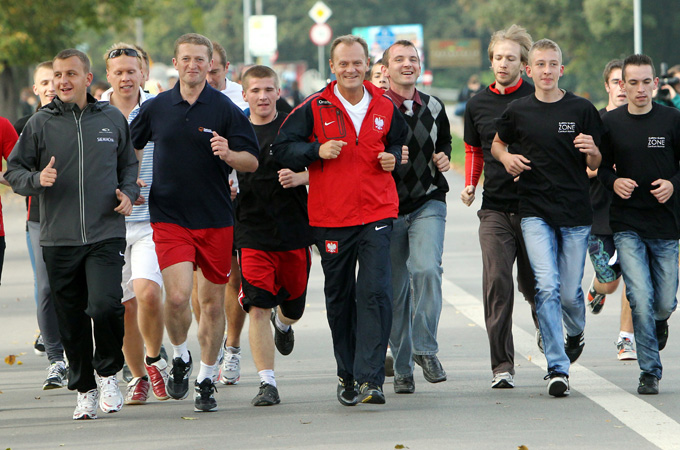Exit polls favour Poland’s ruling party
Civic Platform party likely to get another term after four years of strong economic growth.

 |
| The party of Polish Prime Minister Donald Tusk, centre, was projected to win 212 seats in the 450-seat parliament [EPA] |
The ruling centre-right Civic Platform (PO) party of Donald Tusk, the Polish prime minister, is comfortably ahead in parliamentary elections, an exit poll showed after voting stations closed.
The poll, conducted on Sunday for national television, showed the pro-business, pro-European Union party winning 39.6 per cent against 30.1 per cent for the nationalist-conservative Law and Justice party of Jaroslaw Kaczynski.
If the poll numbers remain as they are, Tusk’s party would make history by becoming the first to win two consecutive terms since the fall of communism in 1989.
The PO, along with its coaltion partner, the Peasants’ Party (PSL), will have enough seats to form a new government, the exit poll showed, projecting a total of 212 seats for PO in the 450-member Sejm, the lower house of parliament, and 27 seats for PSL.
The elections were predicted to determine whether the country would continue on its conciliatory course with Russia and Germany, or whether it would returns to a more combative stance with the historic foes.
Opinion polls had suggested the left-wing Palikot’s Movement, a new party which supports gay rights, abortion and legalisation of soft drugs, could emerge as a potential partner for Tusk’s party.
‘Stable development’
Tusk, who steered the country of more than 38 million people safely through the 2008-2009 global financial crisis, has portrayed himself as a guardian of stability and has claimed he will continue a cautious approach to economic reforms if he wins.
“At stake in this election are security and the stable development of our country. In my view, only PO [Civic Platform] guarantees that,” Tusk said on Friday.
His opponents accuse him of lacking the courage to make ambitious reforms in a country with significant problems, such as high unemployment at around 11 per cent and heavy state regulation that allegedly stifles businesses.
Law and Justice leaders had promised more state involvement in the economy, including a bank tax and higher taxes for the rich, and vowed to wind down large-scale privatisation carried out since the PO took power in late 2007.
“If Poland becomes a strong, developed country, we won’t have to privatise Polish companies, sell state firms for peanuts or privatise hospitals,” Kaczynski told the Fakt tabloid.
Immediate challenge
Analysts believe Poland’s main immediate challenge is to curb the public debt and deficit, which ballooned during the financial crisis.
Ratings agencies have said they could downgrade Poland if it does not swiftly act to reduce the budget deficit, expected to reach 5.6 per cent of gross domestic product this year, and the public debt, expected to reach 53.8 per cent of GDP this year.
Economists doubt Law and Justice would be able to meet the challenge and a short-term sell-off would be likely on Polish financial markets if it won.
The current coalition, however, has failed to deliver on the far-reaching liberal market reforms Tusk originally promised.
The rise in support for Palikot’s Movement came as a surprise. It was founded by a maverick lawmaker, Janusz Palikot, who is with Poland’s powerful Roman Catholic clergy and favors many liberal causes.
Palikot’s party was in third place in some recent polls, ahead of some established parties, and appeared to be benefiting from voters’ disillusionment and increasing secularism.
More than 30 million people were eligible to vote in the election.